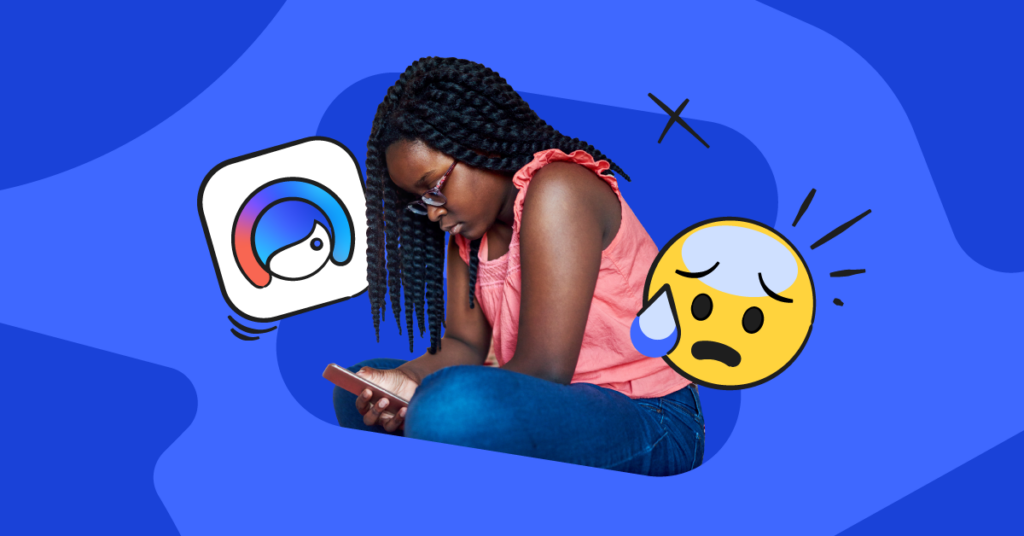
Today, tons of platforms have built-in filters and photo editing tools, but one app helped originally launch the trend back in 2013, and it’s still going strong today: Facetune. In 2021, more than 30 million people downloaded the app on iPhone alone, a sign that people continue to be concerned with removing blemishes and whitening teeth in selfies. The unfortunate thing is that kids are, too.
One of the most chilling things about the Facetune app is that in the App Store, the company recommends it for kids “4 and above.” You don’t have to be a child psychologist to see how apps like Facetune can create unrealistic body standards and create self-image issues for children. In this post, we’ll discuss how Facetune works, how it can negatively affect children, and ways to talk with your child about body image.
How The Facetune App Works
Think of the Facetune app like a smaller, easier-to-use version of Photoshop, the popular photo-editing app used by professionals around the world. But instead of requiring professional cameras and a powerful computer, you simply upload a photo from your phone and can then modify it in a ton of different ways. Some of the more popular editing tools include:
- Whiten: You can use this feature to whiten your eyes, teeth, or even skin.
- Smooth: This lets you flatten out wrinkles (less a worry for kids, obviously) and rough spots on skin.
- Details: With this, you can create a greater focus on a specific feature like eyes, nose, or lips.
- Reshape: Perhaps the most problematic feature of Facetune, this tool lets you literally change the shape of your face or body — from sculpting a thinner jawline to digitally removing 20 pounds from your body’s frame.
- Patch: This spot tool enables you to magically erase pimples, birthmarks, freckles, or even a crumb of food from your face.
In addition to changing aspects of your face and body, you can also do more artistic editing, like defocusing backgrounds, changing the size of a photo, and creating new color palettes to match clothing.
What Kids Learn From The Facetune App
The thing about using Facetune is that it’s such a slippery slope. You probably wouldn’t mind if your child used the Facetune app to remove a stranger from the background of the photo your family took in front of the castle at Disney World. Or if they managed to get rid of a stain on the front of their shirt in a photo with grandma.
But things get tricky when a kid starts using the app to dramatically alter the way they look — consistently. If they use the reshape tool to make themselves look thinner in an Instagram post, it can make them feel better in the short term (in the form of validating likes and comments). But in the long term, it can make them feel bad about themselves because they know their real-life self does not match what they put online.
So they post another edited photo, and it becomes a vicious cycle. Eventually, some kids will come to feel that they can’t post anything but edited photos online, and this can make them feel like they can’t present their real selves to the greater world. There are likely some kids today that have probably never not posted a Facetune selfie — ever.
Digital Filters, Real-Life Effects
Studies have long examined the direct link between social media and eating disorders (we have a whole blog post about it, too), but they often leave out the negative effects of filtering apps like the Facetune app. This is because Facetune (and similar platforms) just facilitate what happens on other apps. You don’t post on Facetune or apps like it, so they’re easy to gloss over.
Many parents can be quick to cut out or limit social media without stopping to think about all of the different apps that create these false depictions of reality and their harmful effects. And these negative effects are serious, leading to issues like poor body image, anxiety, depression, and even disordered eating. When kids only see “perfect” — and fake — photos of people, it reinforces the belief that that’s what they should strive to be, no matter how unrealistic or unobtainable it may be.
Signs Your Kid May Be Struggling With Body Image
Growing up can be a stressful time, and kids have to deal with all sorts of changes as they become young adults. Paying attention to their body is okay… to an extent. If you’re worried that your child is struggling with their body and their feelings about it, pay attention to these warning signs:
- Excessively criticizing their body and appearance
- Obsessing about losing or gaining weight or muscle
- Being overly concerned about one aspect of their body, like their teeth or legs
- Searching for imperfections or changes in photos or in the mirror
- Avoiding social activities that they once enjoyed
Conversation Starters You Can Use
Whether your child uses the Facetune app or just loves the fun filters in TikTok or Snapchat, it’s important to get them to reflect and think critically about what they’re doing. Answers of course will vary depending on how old your kid is, as well as how much time they spend on social media. Here are some icebreakers to get the conversation started:
- What’s your favorite photo filter you’ve ever used?
- How do you feel about yourself when you use a filter?
- Have you ever edited a selfie? What did you do to it?
- Have you ever felt bad about posting a picture of yourself?
- Tell me about how your friends use filters online.
- What’s your favorite part of your body? What’s your favorite non-physical feature?
How Bark Can Help
If you find yourself concerned that your child may be struggling with body image and social media, Bark can help. Bark monitors disordered eating in texts, emails, and 30+ social media platforms and apps. You’ll get an alert if they may be struggling so you can check in and support them. You can also use Bark’s screen time and blocking tools to limit — or prohibit — access to social media or editing apps like Facetune altogether.
Read more
Bark helps families manage and protect their children’s digital lives.




